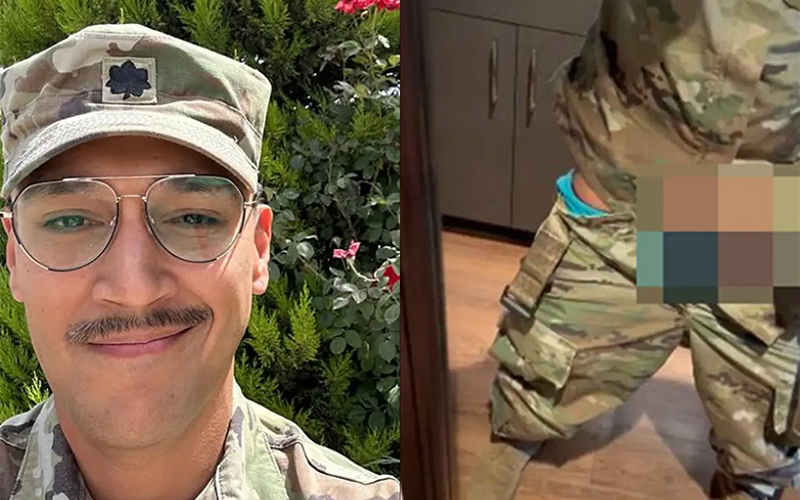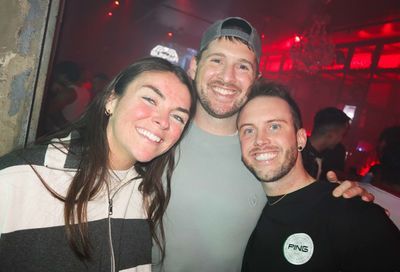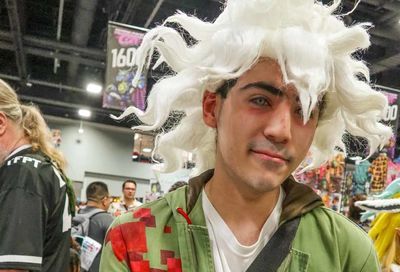Life During Wartime
SLDN finds discharges of gay soldiers declined as nation goes to war
When Austin Rooke got a letter from the Army in December 2001, he didn’t expect that Uncle Sam would still want him. A lot had changed since he ended his active military duty in 1998.
Coming out as gay, for one.
When the letter came, Rooke was part of the Army’s inactive reserves. Unlike active reserves, who commit to on-going service and training each year and are the first to be called back for duty when the military mobilizes for war, the inactive reserves would be unlikely to ever be called back to service. Or so Rooke thought. But things had changed after September 11, and the nation was mobilizing for war.
 |
Rooke, an Army captain who attended college with the aid of ROTC scholarships, had fulfilled half of his eight-year commitment as an active duty soldier. Since leaving active duty, he had focused on his civilian career.
“I had not worn a uniform in three-and-a-half years,” Rooke says.
The callback to the Army initially left him feeling “shocked, dazed and confused…and a little bit pissed.” He was just starting with a new position and looking forward to the responsibilities he would have there.
That position just happened to be with the National Gay and Lesbian Task Force, where he had worked since April of that year. Given the military’s infamous “Don’t Ask, Don’t Tell” (DADT) policy, NGLTF was not the first place you’d expect Uncle Sam to look for soldiers.
But even though the Army wasn’t asking, Rooke wasn’t telling. After the initial shock, he knew that he still had an obligation and the Army was within its rights in calling him back.
 “In my mind, I had a duty I was going to carry out,” he says. “I didn’t think my duty was wrong, or my call up was immoral.”
Rooke’s experience, like other gay and lesbian soldiers who found themselves called back to duty, is a telling example of how the DADT policy works during wartime. While discharges of gay and lesbian servicemembers steadily increased throughout the nineties after the implementation of the program, with the country at war, discharges have dropped significantly — 39 percent from 2001.
That follows the traditional military pattern of keeping gays and lesbians during wartime, says Steve Ralls, director of communications for the Servicemembers Legal Defense Network (SLDN). And if history is any indication, the discharges will rise again when the war concludes.
SLDN yesterday released “Conduct Unbecoming,” its tenth annual report on the DADT policy. With numbers obtained from the military branches through Freedom of Information Act (FOIA) requests — the Pentagon won’t release the numbers on its own — the report shows that even with discharges decreasing, the military still has a problem with not asking.
In fiscal year 2003, 787 servicemembers were discharged under DADT, down from 906 the previous year, and from the ten-year high of 1,273 in 2001. But last year’s discharges are still significantly higher than the 617 servicemembers discharged in 1994, when the policy started.
“They’re still firing about two people every day for being lesbian and gay,” Ralls says. “The policy’s been in place for ten years and 10,000 people have been fired. That’s two full brigades, the number of troops sent into Afghanistan after 9/11.”
Although the Army knew that Rooke’s employer was a gay political organization, the information was not something that could be used to start an investigation against him. And while he had decided that he would be very public about being gay if an investigation was started, he wasn’t going to be the one to start it.
“I had no fear,” he says. “I was in a position of knowledge and power because I knew the law.”
Unfortunately, he notes, most 19 and 20-year-old gays and lesbians coming into the military don’t have that same information, experience and confidence.
After being called back for duty, Rooke worked in military intelligence at Ft. Lewis in Washington. After that, he volunteered to extend his service and was deployed to the Middle East for six months duty as an intelligence officer with Special Operations Forces in Qatar.
While Rooke had made some friends in nearby Seattle during his Ft. Lewis posting, his deployment to Qatar was a big change for him.
“I wasn’t out with anyone,” he says. “I hadn’t experienced that in a long time. That was pretty isolating.”
Rooke found one person to confide in during his time in Qatar, a woman who was his running partner. That coming out was “awesome,” because it had been so long since he had been able to have an open conversation. He also got many care packages from his co-workers at the Task Force.
Ralls says that even in wartime, as DADT discharges decline, lesbian and gay servicemembers still have to take great care and use discretion. Phone calls by overseas troops are monitored, for example, so saying “I love you” to someone of the same sex can start an investigation. And, he says, while attitudes toward gays and lesbians may be more tolerant among younger recruits, gay and lesbian soldiers are still harassed and illegally targeted for investigation.
Currently back in the States and working as the Membership Manager for the Task Force, the 33-year-old Rooke says that he fully expects the number of discharges to go up again in the future, unless DADT is changed.
“I think it will be changed,” he says. “But not with the current makeup of the House, Senate and administration, regardless of what’s rational.”
For the full report of “Conduct Unbecoming” and more information about the Servicemembers Legal Defense Network, visit www.sldn.org.
Support Metro Weekly’s Journalism
These are challenging times for news organizations. And yet it’s crucial we stay active and provide vital resources and information to both our local readers and the world. So won’t you please take a moment and consider supporting Metro Weekly with a membership? For as little as $5 a month, you can help ensure Metro Weekly magazine and MetroWeekly.com remain free, viable resources as we provide the best, most diverse, culturally-resonant LGBTQ coverage in both the D.C. region and around the world. Memberships come with exclusive perks and discounts, your own personal digital delivery of each week’s magazine (and an archive), access to our Member's Lounge when it launches this fall, and exclusive members-only items like Metro Weekly Membership Mugs and Tote Bags! Check out all our membership levels here and please join us today!




















